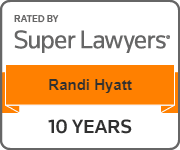Ms. Hyatt is a partner in the Labor and Employment Group advising management in employment law concerns and defending against employment litigation claims. She serves a diverse collection of industries, including healthcare, construction, banking, public sector, non-profits, and educational institutions. Ms. Hyatt focuses her energies on avoiding litigation whenever possible and is dedicated to zealously advocating for her clients in litigation. While accurate and timely legal advice is important, Ms. Hyatt makes certain her legal advice is practical and aligns with her client’s needs.
Ms. Hyatt regularly represents employers in state and federal courts and agencies in matters involving discrimination, harassment, retaliation, wage and hour disputes, protected medical leaves, wrongful termination, breach of employment agreements, and related federal and state employment claims.
Beyond advice and counsel and litigation defense, Ms. Hyatt provides workplace training on employment matters, drafts and revises handbooks and policies, creates and refines offer letters, severance agreements, and other necessary employment documents and conducts compliance audits involving wage and hour issues.
Ms. Hyatt helps clients navigate challenging situations involving high-level officials, employees on leave or in other protected categories, and/or challenging workplace harassment issues that need to be handled sensitively. In addition to conducting internal investigations for her own clients, Ms. Hyatt is regularly relied upon to conduct investigations for outside law firms looking for a skilled and discreet investigator.
Recognitions
- Maryland Super Lawyers®, Employment Litigation, Employment & Labor (2014–Present)
- AV Preeminent®: Martindale-Hubbell® Peer Review Ratings™
Memberships & Activities
- Class of 2025: The Leadership, Baltimore
- Member: American Employment Law Council
- Member: Maryland State Bar Association
- Labor and Employment Law Section
- Member: DC Bar
- Labor and Employment Law Section
- Mentor: University of Baltimore School of Law
- Former Adjunct Faculty: University of Baltimore School of Law (Legal Writing and Employment Law)




